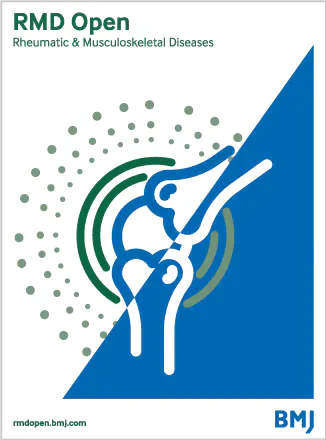Use of risk chart algorithms for the identification of psoriatic arthritis patients at high risk for cardiovascular disease: findings derived from the project CARMA cohort after a 7.5-year follow-up period
IF 5.1
2区 医学
Q1 RHEUMATOLOGY
引用次数: 0
Abstract
Objective To assess the predictive value of four cardiovascular (CV) risk algorithms for identifying high-risk psoriatic arthritis (PsA) patients. Methods Evaluation of patients with PsA enrolled in the Spanish prospective project CARdiovascular in RheuMAtology. Baseline data of 669 PsA patients with no history of CV events at the baseline visit, who were followed in rheumatology outpatient clinics at tertiary centres for 7.5 years, were retrospectively analysed to test the performance of the Systematic Coronary Risk Assessment (SCORE), the modified version (mSCORE) European Alliance of Rheumatology Associations (EULAR) 2015/2016, the SCORE2 algorithm (the updated and improved version of SCORE) and the QRESEARCH risk estimator version 3 (QRISK3). Results Over 4790 years of follow-up, there were 34 CV events, resulting in a linearised rate of 7.10 per 1000 person-years (95% CI 4.92 to 9.92). The four CV risk scales showed strong correlations and all showed significant associations with CV events (p<0.001). SCORE, mSCORE EULAR 2015/2016 and QRISK3 effectively differentiated between low and high CV risk patients, although the cumulative rate of CV events observed over 7.5 years was lower than expected based on the frequency predicted by these risk scales. Additionally, model improvement was observed when combining QRISK3 with any other scale, particularly the combination of QRISK3 and SCORE2, which yielded the lowest Akaike information criterion (411.15) and Bayesian information criterion (420.10), making it the best predictive model. Conclusions Risk chart algorithms are very useful for discriminating PsA at low and high CV risk. An integrated model featuring QRISK3 and SCORE2 yielded the optimal synergy of QRISK3’s discrimination ability and SCORE2’s calibration accuracy. No data are available.使用风险图表算法识别心血管疾病高风险银屑病关节炎患者:CARMA 项目队列 7.5 年随访后得出的结论
目的 评估四种心血管 (CV) 风险算法对识别高风险银屑病关节炎 (PsA) 患者的预测价值。方法 对参加西班牙前瞻性项目 CARdiovascular in RheuMAtology 的 PsA 患者进行评估。对 669 名 PsA 患者的基线数据进行了回顾性分析,这些患者在基线就诊时无心血管事件史,并在三级中心的风湿病门诊接受了 7.5 年的随访。回顾性分析了这 669 名 PsA 患者的数据,以检验系统性冠状动脉风险评估 (SCORE)、欧洲风湿病学协会联盟 (EULAR) 2015/2016 年修订版 (mSCORE)、SCORE2 算法(SCORE 的更新改进版)和 QRESEARCH 风险估计器第 3 版 (QRISK3) 的性能。结果 在 4790 年的随访中,共发生了 34 起 CV 事件,线性化比率为每 1000 人年 7.10 起(95% CI 4.92 至 9.92)。四种冠心病风险量表显示出很强的相关性,并且都与冠心病事件有显著关联(P<0.001)。SCORE、mSCORE EULAR 2015/2016 和 QRISK3 能有效区分低和高 CV 风险患者,尽管根据这些风险量表预测的频率,7.5 年中观察到的 CV 事件累积率低于预期。此外,将 QRISK3 与任何其他量表组合时,都能观察到模型的改进,尤其是 QRISK3 与 SCORE2 的组合,其产生的 Akaike 信息标准(411.15)和贝叶斯信息标准(420.10)最低,使其成为最佳预测模型。结论 风险图算法对于区分PsA的低CV风险和高CV风险非常有用。以 QRISK3 和 SCORE2 为特征的综合模型可使 QRISK3 的判别能力和 SCORE2 的校准准确性达到最佳协同效果。暂无数据。
本文章由计算机程序翻译,如有差异,请以英文原文为准。
求助全文
约1分钟内获得全文
求助全文
来源期刊

RMD Open
RHEUMATOLOGY-
CiteScore
7.30
自引率
6.50%
发文量
205
审稿时长
14 weeks
期刊介绍:
RMD Open publishes high quality peer-reviewed original research covering the full spectrum of musculoskeletal disorders, rheumatism and connective tissue diseases, including osteoporosis, spine and rehabilitation. Clinical and epidemiological research, basic and translational medicine, interesting clinical cases, and smaller studies that add to the literature are all considered.
 求助内容:
求助内容: 应助结果提醒方式:
应助结果提醒方式:


